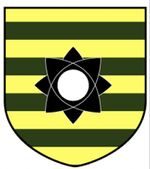Tianji
| Tianji
恬庴 | |
|---|---|
| Flag | Coat of Arms |

|
 |
| Motto: 八角一心
"Eight Sides, One Heart" | |
| Anthem: Ten Thousand Years | |
| Locator map | |
 | |
| Capital city | |
| Largest city | |
| Official language | Yānhuà (嫣話), Ng |
| Other languages | |
| Ethnic groups | Yan |
| Religion | Shuocianism, Kin |
| Demonym(s) | Tianjic |
| Government | |
| Government Type | Imperial Oligarchy |
| Emperor | Jīyào (卟耀) |
| Chancellor of the Whites | Qiáogǔ Biāo (橋谷彪) |
| Blue Elder | |
| Violet Elder | |
| Legislature | The Tǒnghuì (統會) |
| Establishment | |
| The First Dynasty | 5104 RH |
| Area | |
| Total | 6,896,101.99 km2 |
| Water % | 0.0% |
| Population | |
| Total | 794,996,430 |
| Density | 115.28/km2 |
| Economy | |
| Economy type | Communitarian Capitalism |
| GDP (total) | Ꞡ 1,873,465,872,308.74 |
| GDP per capita | Ꞡ 2,356.57 |
| Currency | Chao |
| Currency symbol | 鈔 |
| Inequality index | 0.0 |
| Development index | 0.0 |
| Other information | |
| Time zone | TBC |
| Driving side | right |
| Calling code | +116 |
| Internet code | .yan |
Tianji (恬庴, Tiànjí) is a small but important nation in Davai just off the coast of Yanwen, controlling the entrance to the Sensumen Sea.
The Tianji Islands are small and relatively harmless, and have long been home to the Yú (漁; Yú Ng), a race of semi-nomadic fisherfolk. Unlike most of the mainland, the Yú maintain the ancient and traditional moiety system, used to determine kinship on the various islands. Each island is ruled by a council of oligarchs, the most senior members of each moiety, with their seconds-in-command standing nearby. The Yú take little pleasure in politics, preferring instead a simple life of fishing and trade. Unfortunately, perhaps, the islands’ practically untapped mineral resources have caught the interest of the bèi or Factions of Yanwen. More to the point, the person who controls Tianji also controls access to the Yan River from the ocean—something they are loath to grant to another nation.
Government
The islands are governed by an Executive Council, with seats set aside for the nobility, the most prominent shipping captains and merchants, and the civil service. Key to the Council is the requirement that, in order to maintain one’s seat, one must be able to (and actively) fund some effort which is deemed essential to life on the islands, be that part of the military, the education system, the upkeep of one city or another, the health system, even some new infrastructure development such as a temple or public housing complex.
Economy
The islands retain a sense of pride at their focus on improvement and financial astuteness.